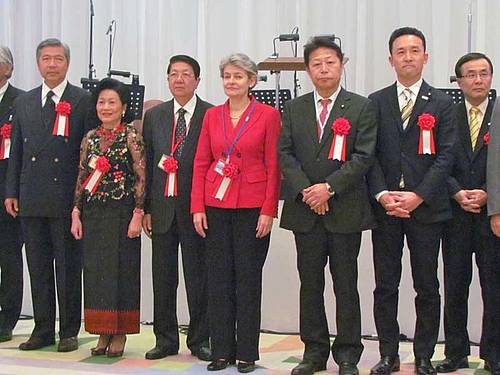
"Japan
is an outstanding and longstanding champion of UNESCO's World Heritage
Convention -- its commitment reflects values deeply held in Japanese society,
values that are sustained by national authorities, local communities, the
private sector, youth engagement, and ordinary people all across the
country," so declared the Director-General Irina Bokova in Kyoto, Japan,
during the International Conference marking the closing of the 40th anniversary
of the 1972 World Heritage Convention.
The
Conference was hosted by the Government of Japan in the iconic city of Kyoto,
whose region includes some 17 World Heritage sites. The Closing took place in
the presence of Mr. Sok Han, the Vice Prime Minister of the Kingdom of Cambodia
and Chairman of the World Heritage Committee, Mr. Kazuyuki Hamada,
Parliamentary Vice-Minister for Foreign Affairs, Mr. Daisuke Matsumoto, Senior
Vice-Minister of Education, Culture, Sports, Science and Technology, Mr.
Yasuhiro Kajiwara, Parliamentary Secretary for Agriculture, Forestry and Fisheries,
Mr. Kazuaki Hoshino, Deputy Director General Natural Conservation Bureau,
Ministry of the Environment, Ms. Alissandra Cummins, Chairperson of the UNESCO
Executive Board, Mr. Genshitsu Sen, UNESCO Goodwill Ambassador and also Mr.
Koichiro Matsuura, Former Director-General of UNESCO.
The
audience included cultural and natural heritage experts, representatives of
governments from 60 countries, as well as municipal authorities, local
communities, and civil society, totalling some 400 participants.
The
Conference ranges over three days to explore the theme of the role of local
communities for sustainable development. Discussions focus also on how to
continue ensuring the credibility of the World Heritage Convention in the face
of increasing pressures on cultural heritage from rapid urbanization, mass
tourism, climate change, and conflict situations.
Deliberations
will consider especially community involvement in the preservation of cultural
heritage, youth engagement and heritage education with a view to ensuring the
sustainable development of cultural heritage worldwide.
The
outcome will be a renewed written commitment, embodied in "The Kyoto
Vision", to strengthen the Convention as a tool for international
cooperation, sustainable development and peace over the long-term.
The
Director-General was also presented with the "Appeal of Tomorrow's Kyoto
Cultural Heritage Platform" by its President Mr. Koichiro Matsuura -- a
Platform that was established to ensure the long-term protection of cultural
heritage in the city of Kyoto following the earthquake and tsunami that
affected Japan in March 2011. The platform represents the collective engagement
of local government structures and efforts of the citizens of the city to
develop preventive disaster mitigation measures from a long-term perspective.
The
Director-General commended deeply the Japanese national and municipal
authorities, and in particular the Kyoto Committee for the 40th anniversary of
the World Heritage Convention, for their exceptional commitment to heritage
preservation and to the values enshrined in the Convention.
"Kyoto
best exemplifies the World Heritage pact," declared Irina Bokova, "as
it embeds nature and culture, the wealth of cultural diversity, its living
heritage and tradition, community-and youth-engagement through its universities
and centres of excellence, all of which converges to protect identity and
heritage."
During
her visit to Japan, the Director-General also held a bilateral meeting with the
Chief Executive Officer of Panasonic, Mr. Fumio Ohtsubo, following the renewal
of UNESCO's partnership agreement with this major partner to enhance awareness
raising and educational outreach activities for Wolrd Heritage.
Irina
Bokova participated in the Panasonic Eco Picture Diary Contest Awards,
acknowledging youth engagement in the sustainable environmental protection of
cultural and natural heritage worldwide and gathering some 50 young girls and
boys, aged 7 to 12 years from 38 countries.
The
visit to Kyoto also featured the signing of a Cooperation Agreement with
Professor Hiroshi Matsumoto, President of Kyoto University, for the
establishment of an internship programme to strengthen UNESCO's action --
"through many talented young women and men coming from one of the world's
leading institutions of higher learning, a haven for Nobel Prize winners and
Fields medallists" said Irina Bokova. "Young women and men carry the
greatest burden of change but they are also leading it" she added.
The
signing ceremony was followed by a lecture delivered by the Director-General in
the presence of a large audience of professors and students from Kyoto
University, a highly renowned research institution dating back to 1886 which
counts 7 Nobel Prizes for Physics and Medicine.
